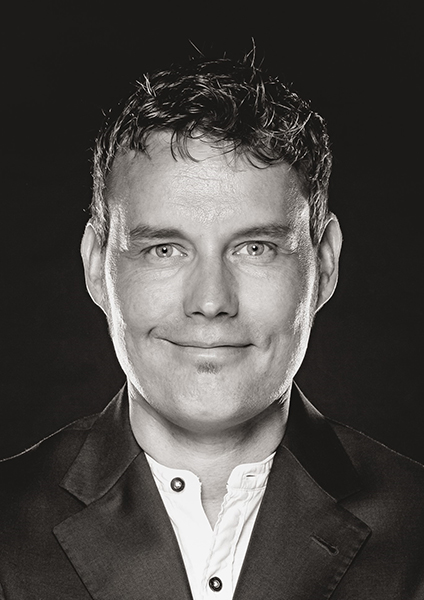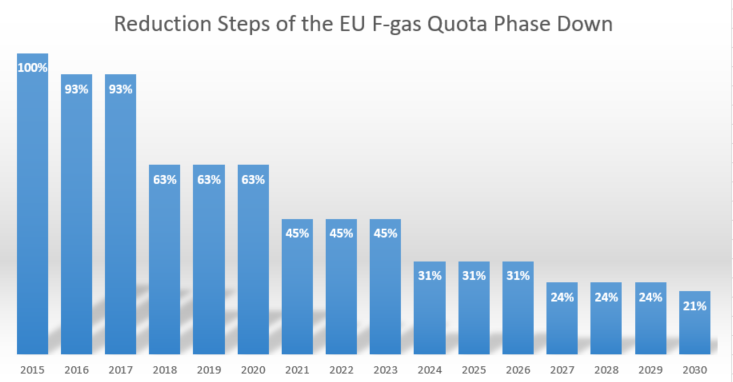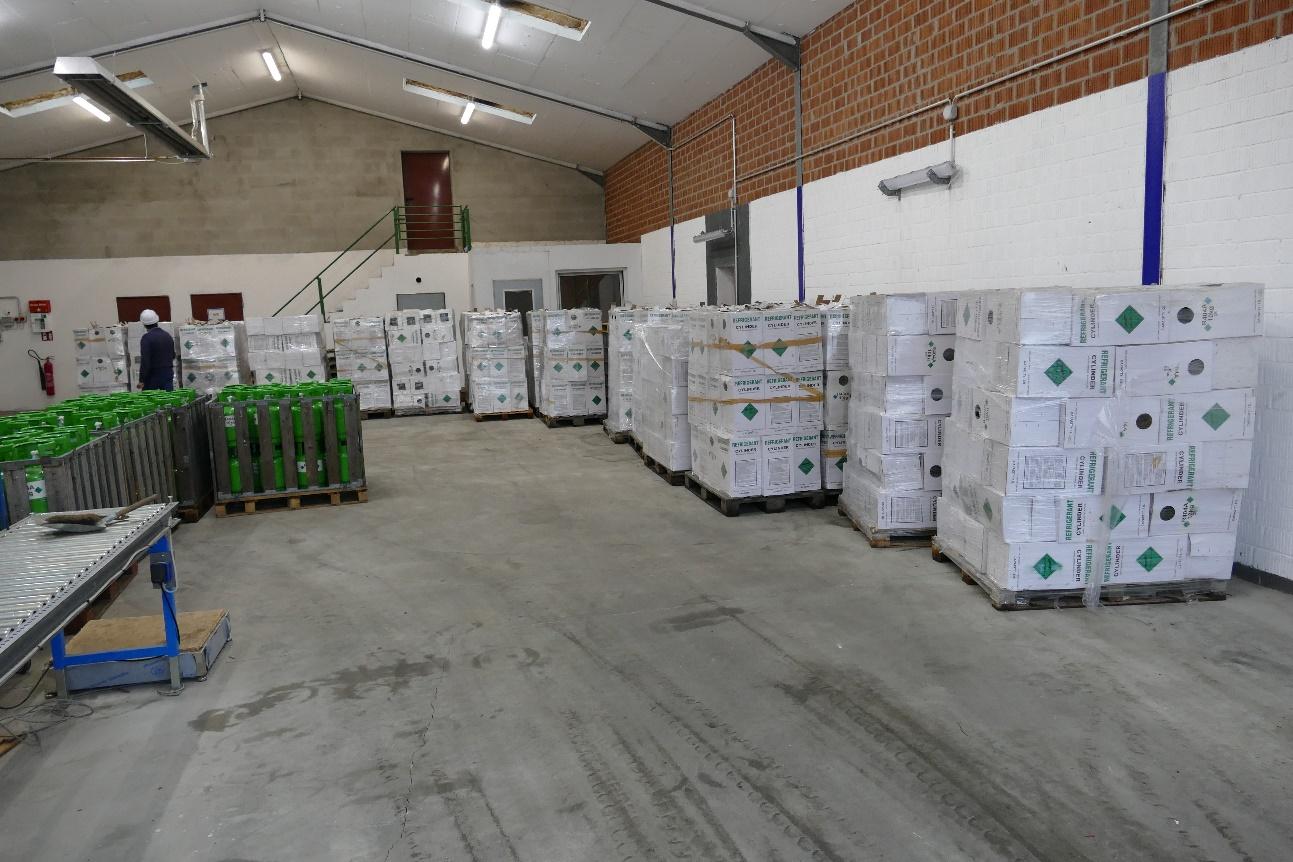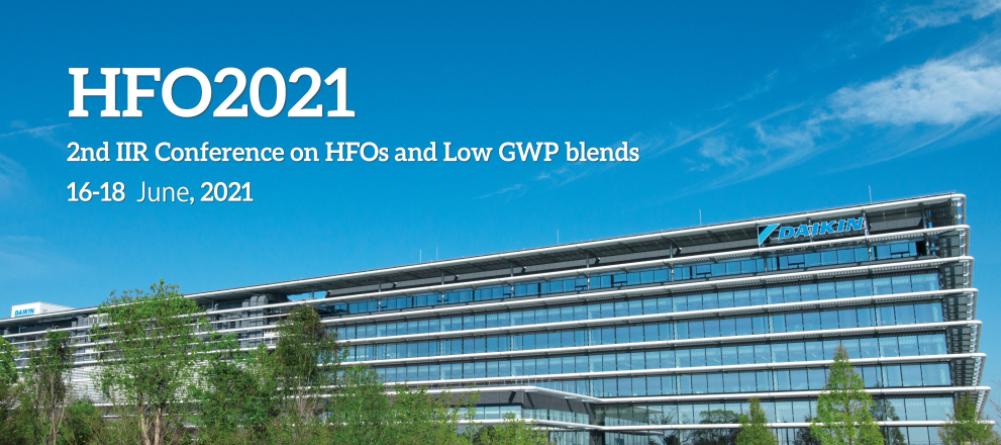Daikin Refrigerant News - Issue 2, 2021
Dear friends and partners of Daikin Chemicals,
The illegal trade of refrigerants does not only undermine the aim of the F-Gas Regulation to reduce HFCs, it also harbors safety risks.
The EU F-gas regulation is gradually reducing the amount of certain refrigerants available. The tightened supply fosters illegal imports into the EU, and HFCs are also affected by this.
While law-abiding manufacturers and importers are subject to the quota system, organized crime profits from it, especially since the penalties so far have been low.
In the 3rd edition of our Daikin Refrigerant Newsletter we want to focus on this important topic.
Kind regards and enjoy reading
Your Tobias Bargsten
Business Manager Refrigerants Daikin Chemical Europe

The threat of the black market for refrigerants remains high
The regulation on fluorinated greenhouse gases (F-gases), which came into force in 2014, plans to significantly limit the quantities of partially halogenated fluorocarbons (HFCs), which are a major contributor to global warming, by 2030. The corresponding drop in availability has fostered a black market for refrigerants, which poses growing challenges for numerous industries. This not only applies to air conditioning and cooling systems in buildings or vehicles, but also to the cooling and cooling requirements of the retail trade.

Less than half of the original F-gas quotas are now available to the EU market.
The black market for F-gases is of significant proportion
The greenhouse effect of HFC refrigerants, which, if they are released into the atmosphere, is many times higher than that of CO₂. The aim of the European F-Gas Regulation is therefore to gradually reduce the amount of HFC refrigerants available on the market by 79 percent by 2030 through a quota mechanism. The falling availability, in turn, has favored a black market that potentially could be the size of around a third (!) of the legally traded HFCs in Europe.
One thing is clear: the black market is endangering the EU's climate goals pursued by the F-Gas Regulation. It funds organized crime and promotes tax evasion.
How can retailers identify illegal goods?
- Refrigerants should not be purchased in disposable cylinders, as these are prohibited in the EU. The seller of refrigerants should guarantee that the empty containers will be taken back.
- The containers should be checked for the presence of the π stamp on the name of the producer.
- The EN-1 3322-1 marking should be recognizable.
- A safety data sheet should always be available.
All players from retail and manufacturing can show their conscious use of refrigerants by participating in the EFCTC's “Pledge” initiative.
If there is a concrete suspicion of illegally traded HFCs, it is possible to contact the so-called "Action Line" (Whistleblower Line) set up by the EFCTC on a confidential basis.
RCN Chemie and Daikin dispose of 1.000 bottles of illegal refrigerant

1.000 bottles of confiscated, illegal refrigerant which were disposed of by RCN Chemie and Daikin.
Daikin Refrigerants Frankfurt GmbH (DRF) and RCN Chemie GmbH (RCN) have been working together for the environmental friendly recycling of refrigerant waste for over 25 years.
1.000 bottles of illegal product
End of 2020, RCN received a request from a Dutch waste disposal company to take over and dispose of 1.000 bottles of confiscated, illegal refrigerant. It was about 10 tons of refrigerants (~40,000 tons of CO₂ equivalent) that were already prepared for illegal sale in the EU. After RCN won the bid, the 1.000 bottles were transported to RCN Headquarter in Goch.
After receiving the illegal material, RCN analyzed the bottles in its internal laboratory. The analysis confirmed that the HFCs in question met the specification for further treatment in Daikin’s cracking plant in Frankfurt/Höchst. After the bottles had been analysed, the illegal refrigerant was pre-treated, transferred to large pressure vessels and then transported to Daikin in Frankfurt for thermal splitting treatment.
No waste is generated
Daikin’s disposal process involves a thermal conversion treatment of the waste refrigerants. The refrigerants are split into hydrofluoric and hydrochloric acid in an oxyhydrogen flame and then reused as a raw material in the chemical industry. There is no waste that has to be disposed of as liquids or solids. The process has a very high performance capacity and conversion rate with nearly zero residues.
In addition to the environmentally friendly disposal of halogenated refrigerants, Daikin has also been operating a distillation plant in Frankfurt since the beginning of 2020 for the separation and processing of non-pure F-gases that were recovered from existing systems in accordance with the EU F-Gas Regulation.
Come join us at the HFO2021, the 2nd IIR Conference on HFOs and Low GWP blends

HFO2021 is recognized worldwide as a cutting-edge event
Daikin would like to kindly invite you to HFO2021, the 2nd IIR Conference on HFOs and Low GWP blends, which will take place online June 16-18,2021.
The 1st conference was held at IET Birmingham Austin Court in 2018. This second conference, HFO2021, will provide up-to-date information on the experience and use of HFOs and low GWP blends globally.
HFO2021 is recognized worldwide as a cutting-edge event to alleviate the current global environmental issues including global warming and climate change. The international participants of this conference will be researchers, engineers, and practitioners, who gather to bring their latest developments and key technology trends on all HFOs and low GWP blends for the future refrigeration and air conditioning fields.
The program will include:
- Physical properties (general and chemical properties, chemical processes, thermophysical properties, equation of state, material compatibility, solubility, etc.)
- Transfer processes (heat and mass transfer, two phase flow, heat exchanger, heat transfer enhancement, secondary refrigerant, etc.)
- Application (cycle simulation, equipment, foaming agent, heat insulating material, solvent, spray, etc.)
- Environment and Regulations (regulations and standards, environmental issues, etc.)
You can register for this excellent opportunity to get the latest business insights here.

